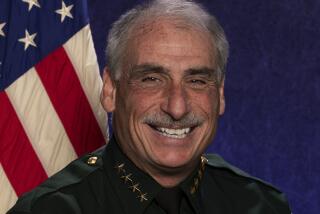In Vitro Twins Eligible for Aid
A child conceived using frozen sperm after the death of his or her father should be eligible to collect Social Security survivor benefits just as any other child whose parent has died, a federal appeals court ruled Wednesday.
Although fatherhood after death is still rare, such cases now occur often enough to have attracted the attention of policymakers and judges alike.
For the record:
12:00 a.m. June 11, 2004 For The Record
Los Angeles Times Friday June 11, 2004 Home Edition Main News Part A Page 2 National Desk 1 inches; 62 words Type of Material: Correction
Frozen reproductive cells -- Articles May 17 in Section A and June 10 in the California section about in vitro fertilization said that although human sperm can be frozen and then used successfully, human eggs cannot yet be viable after freezing. Although the technique remains experimental, researchers in human fertility have reported successful pregnancies using frozen egg cells in a few cases.
Bills moving through the California Legislature, for example, would grant inheritance rights to children conceived after a father’s death if they meet certain conditions.
About 400,000 frozen human embryos exist in the United States and tens of thousands of men have preserved their sperm for future use.
Egg cells cannot yet be frozen and remain viable.
“Developing reproductive technology has outpaced federal and state laws, which currently do not address directly the legal issues created by posthumous conception,” Judge Betty B. Fletcher of the U.S. 9th Circuit Court of Appeals in San Francisco wrote in Wednesday’s unanimous decision, which will affect cases in California and eight other Western states under the court’s jurisdiction.
The case involved 7-year-old Arizona twins who were conceived after their father died of cancer.
The parents, Robert Netting and his wife, Rhonda Gillett-Netting, both anthropology professors at the University of Arizona, had tried for several years to have a baby.
Gillett-Netting “suffered from fertility problems that caused her to miscarry twice,” Fletcher wrote.
In December 1994, Netting was diagnosed with multiple myeloma.
After doctors told him that chemotherapy might render him sterile, he deposited his semen at the University of Arizona Health Sciences Center, where it was frozen and stored.
Netting died two months later, before his wife was able to conceive. Netting had “confirmed that he wanted [his wife] to have their child after his death using his frozen sperm,” the judges noted. Consequently, the ruling avoided some of the issues that have come up in other cases in which women have become pregnant using sperm taken from men shortly after their deaths.
About 10 months after Netting’s death, his widow became pregnant using in vitro fertilization.
Two weeks after the twins, Piers and Juliet, were born in August 1996, Gillett-Netting filed an application for child’s insurance benefits from the Social Security Administration.
The agency denied the claim, ruling that the children could not be considered dependents of their father because their father was dead before they were conceived.
When Gillett-Netting sued, a federal district judge in Tucson agreed with the Social Security Administration.
But the 9th Circuit saw the issue differently. Under the Social Security Act, any child who is the “natural or biological child” of a person automatically is considered a dependent except in certain narrowly defined circumstances, the court said.
“Dependency is a broad concept under the [Social Security] Act, whereby the vast majority of children are statutorily deemed dependent on their deceased parents,” Fletcher wrote.
Federal legal policy is that the Social Security law should be “construed liberally to ensure that children are provided for financially after the death of a parent,” she added.
Her opinion was joined by 9th Circuit Judge Stephen Reinhardt and Jane A. Restani, a judge on the U.S. Court of International Trade sitting by special assignment.
Gillett-Netting said she was “absolutely thrilled” by the outcome. She said she did not know how much her court victory would net her and her children but said it was her understanding they would be entitled to benefits starting from the time the suit was filed. Dealing with Social Security officials was “frustrating,” she said. “It was very difficult to communicate with them. That’s why I went to a lawyer.”
Hagit Elul of the New York law firm of Hughes, Hubbard & Reed, who worked on the case without taking a fee, said the ruling was a “really important victory for children. It affirms that all children should be treated equally regardless of the circumstances of their birth.”
Elul represented the family along with Priscilla Smith of the Center for Reproductive Rights in New York.
The Justice Department, which represented the Social Security Administration in court, had no immediate comment.
Sharona Hoffman, associate professor of law at Case Western Reserve University Law School in Cleveland, called the ruling “a fascinating ... cutting-edge decision.”
“I’m certain we will see more of these cases,” said Hoffman, a health-law specialist who has written a law journal article on this subject. “There are 400,000 frozen embryos in this country. Some of these will give rise to the same questions, whether they be in the area of Social Security or inheritance rights,” Hoffman said.
“Almost none of the state inheritance statutes or the federal statutes that deal with government benefits deal with this issue. They were written before [in vitro fertilization] became a reality.”
More to Read
Sign up for Essential California
The most important California stories and recommendations in your inbox every morning.
You may occasionally receive promotional content from the Los Angeles Times.










